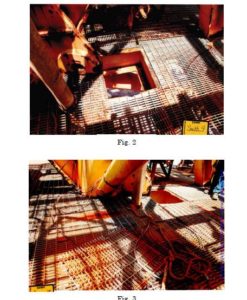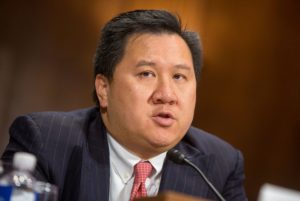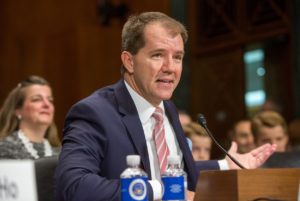 Solomon brought a False Claims Act case allleging improper billing on the F-35 Joint Strike Fighter Project. The Fifth Circuit affirmed the dismissal of his claim under the “public disclosure bar,” examining three disclosures under this test: “We are not concerned . . . with the overall probability of someone inferring fraudulent activity from the public disclosures. The focus is on whether they could have made the inference.” Solomon v. Lockheed Martin Corp., No. 17-10046 (Dec. 19, 2017).
Solomon brought a False Claims Act case allleging improper billing on the F-35 Joint Strike Fighter Project. The Fifth Circuit affirmed the dismissal of his claim under the “public disclosure bar,” examining three disclosures under this test: “We are not concerned . . . with the overall probability of someone inferring fraudulent activity from the public disclosures. The focus is on whether they could have made the inference.” Solomon v. Lockheed Martin Corp., No. 17-10046 (Dec. 19, 2017).
Monthly Archives: December 2017
 A longshoreman died after stepping through a hole on an oil platform. The district court granted summary judgment, finding no fact issue about the “open and obvious” nature of the hole – a necessary element for recovery under the LHWCA. The Fifth Circuit reversed, finding conflicting testimony on the issue, and commenting on pictures of the scene (right): “True, the pictures taken directly over the hole, as one might expect, depict a visible opening. But the pictures taken from an angle–similar to the point of view of a person approaching the hole–depict the way in which the platform’s grating, in [a witness’s] words, can ‘play tricks on your eyes’ and make the opening difficult to see.” The Court reminded that even though the case would be tried to the bench: “Judicial efficiency is a noble goal, to be sure. But when an evidentiary record contains a material factual dispute (as this one does), we simply cannot bypass the role of the fact-finder, whoever that may be.” Manson Gulf LLC v. Modern American Recycling Service, Inc., No. 17-30007 (Dec. 18, 2017).
A longshoreman died after stepping through a hole on an oil platform. The district court granted summary judgment, finding no fact issue about the “open and obvious” nature of the hole – a necessary element for recovery under the LHWCA. The Fifth Circuit reversed, finding conflicting testimony on the issue, and commenting on pictures of the scene (right): “True, the pictures taken directly over the hole, as one might expect, depict a visible opening. But the pictures taken from an angle–similar to the point of view of a person approaching the hole–depict the way in which the platform’s grating, in [a witness’s] words, can ‘play tricks on your eyes’ and make the opening difficult to see.” The Court reminded that even though the case would be tried to the bench: “Judicial efficiency is a noble goal, to be sure. But when an evidentiary record contains a material factual dispute (as this one does), we simply cannot bypass the role of the fact-finder, whoever that may be.” Manson Gulf LLC v. Modern American Recycling Service, Inc., No. 17-30007 (Dec. 18, 2017).
 In Howard v. Maxum Indemnity Co., “Howard’s appeal raises as a central, threshold question whether he waived application of Oklahoma law” in an insurance dispute. Unfortunately, “[a]lthough Howard did raise the choice of law issue in his Rule 59(e) motion, ‘this court will typically not consider an issue or a new arugment raised for the first time in a motion for reconsideration in the district court.’ . . . ‘Parties generally are bound by the theory of law they argue in the district court, absent some manifest injustice.'” No. 16-11746 (Dec. 13, 2017).
In Howard v. Maxum Indemnity Co., “Howard’s appeal raises as a central, threshold question whether he waived application of Oklahoma law” in an insurance dispute. Unfortunately, “[a]lthough Howard did raise the choice of law issue in his Rule 59(e) motion, ‘this court will typically not consider an issue or a new arugment raised for the first time in a motion for reconsideration in the district court.’ . . . ‘Parties generally are bound by the theory of law they argue in the district court, absent some manifest injustice.'” No. 16-11746 (Dec. 13, 2017).
 In this not-unusual situation, the Fifth Circuit found that a removal based on diversity was timely: In response to special exceptions, [the Strongs] filed an amended petition stating the maximum amount of damages in controversy by specifying that the Strongs sought “monetary relief of $100,000 or less.” Cf. Tex. R. Civ. P. 169 (requiring the “$100,000 or less” language to allow for expedited actions). The Strongs also sought injunctive relief ordering both a loan modification to prevent further TDCA violation and “the arrearage . . . to be deleted and/or capitalized . . . so that the loan is brought current.” Green Tree did not remove to federal district court until after it received a response to its request for disclosure in which the Strongs explicitly indicated that they were seeking damages in excess of $75,000.” The Court rejected the Strong’s argument that the petition implictly placed the entire property value at issue. Strong v. Green Tree Servicing LLC, No. 16-11346 (Dec. 11, 2017) (unpublished).
In this not-unusual situation, the Fifth Circuit found that a removal based on diversity was timely: In response to special exceptions, [the Strongs] filed an amended petition stating the maximum amount of damages in controversy by specifying that the Strongs sought “monetary relief of $100,000 or less.” Cf. Tex. R. Civ. P. 169 (requiring the “$100,000 or less” language to allow for expedited actions). The Strongs also sought injunctive relief ordering both a loan modification to prevent further TDCA violation and “the arrearage . . . to be deleted and/or capitalized . . . so that the loan is brought current.” Green Tree did not remove to federal district court until after it received a response to its request for disclosure in which the Strongs explicitly indicated that they were seeking damages in excess of $75,000.” The Court rejected the Strong’s argument that the petition implictly placed the entire property value at issue. Strong v. Green Tree Servicing LLC, No. 16-11346 (Dec. 11, 2017) (unpublished).
 The Senate has now also confirmed Jim Ho to the Fifth Circuit.
The Senate has now also confirmed Jim Ho to the Fifth Circuit.
The Senate has confirmed Justice Don Willett ‘s nomination to the Fifth Circuit.
‘s nomination to the Fifth Circuit.
 “Upset that a coworker had been fired, Thomas[, a network adminstrator,] embarked on a weekend campaign of electronic sabotage.” He was successfully prosecuted under the Computer Fraud and Abuse Act, which criminalizes conduct that “knowingly causes the transmission of a program, information, code, or command, and as a result of such conduct, intentionally causes damage without authorization, to a protected computer.” Thomas, citing his network administration responsibilities, argued that “because he was authorized to damage the computer when engaging in [certain] routine tasks, any damage he caused while an employee was not ‘without authorization.’” The Fifth Circuit rejected this argument, noting – in addition to obvious practical issues – that the case law Thomas relied on about “authorization” involved liability under other CFAA provisions about computer access, rather than this provision about causing damage. This case is of general interest to civil litigation, both because CFAA violations can create civil liability, and because unfortunate admissions can have significant consequences:
“Upset that a coworker had been fired, Thomas[, a network adminstrator,] embarked on a weekend campaign of electronic sabotage.” He was successfully prosecuted under the Computer Fraud and Abuse Act, which criminalizes conduct that “knowingly causes the transmission of a program, information, code, or command, and as a result of such conduct, intentionally causes damage without authorization, to a protected computer.” Thomas, citing his network administration responsibilities, argued that “because he was authorized to damage the computer when engaging in [certain] routine tasks, any damage he caused while an employee was not ‘without authorization.’” The Fifth Circuit rejected this argument, noting – in addition to obvious practical issues – that the case law Thomas relied on about “authorization” involved liability under other CFAA provisions about computer access, rather than this provision about causing damage. This case is of general interest to civil litigation, both because CFAA violations can create civil liability, and because unfortunate admissions can have significant consequences:
Just a couple weeks after the damage spree, and before the FBI had contacted Thomas, he told the friend whose firing had set this in motion that “he thought he might have broken the law.” Which law, the friend inquired? Thomas’s response: “the Computer Fraud and Abuse Act.”
United States v. Thomas, No. 16-41264 (Dec. 11, 2017).
 Griffith sued his former employer under state law, referring in the pleading to a charge he filed with the EEOC and its issuance of a right-to-sue notice. Alcon removed based on federal question jurisdiction; the district court accepted the removal and granted summary judgment to the employer. The Fifth Circuit reversed: “Although Griffith indeed referenced his dealings with the EEOC in his complaint, he did not mention Title VII or any similar federal statute. As such, the district court lacked subject-matter jurisdiciton and was not entitled to render judgment in Alcon’s favor.” Griffith v. Alcon Research, No. 17-20290 (Dec. 6, 2017, unpublished).
Griffith sued his former employer under state law, referring in the pleading to a charge he filed with the EEOC and its issuance of a right-to-sue notice. Alcon removed based on federal question jurisdiction; the district court accepted the removal and granted summary judgment to the employer. The Fifth Circuit reversed: “Although Griffith indeed referenced his dealings with the EEOC in his complaint, he did not mention Title VII or any similar federal statute. As such, the district court lacked subject-matter jurisdiciton and was not entitled to render judgment in Alcon’s favor.” Griffith v. Alcon Research, No. 17-20290 (Dec. 6, 2017, unpublished).
 DRI’s 2018 Appellate Advocacy Seminar will be held at the Planet Hollywood Resort in Las Vegas from March 14-15, 2018. This year’s seminar will include valuable insights into effective advocacy (including tips from Bryan Garner), and joint sessions with trial court practitioners. The seminar promises great networking opportunities with judges, appellate practitioners and trial advocates from across the country. This year’s seminar will be held in conjunction with the Trial Tactics Seminar, and anyone attending the appellate seminar can attend the final day of the Trial Tactics Seminar for no cost. The seminar also coincides with the beginning of the NCAA men’s basketball tournament, a great time to enjoy the excitement of Las Vegas. You can register for the Appellate Seminar here. Save $100 and get the best hotel rates when you register and book by February 13, 2018.
DRI’s 2018 Appellate Advocacy Seminar will be held at the Planet Hollywood Resort in Las Vegas from March 14-15, 2018. This year’s seminar will include valuable insights into effective advocacy (including tips from Bryan Garner), and joint sessions with trial court practitioners. The seminar promises great networking opportunities with judges, appellate practitioners and trial advocates from across the country. This year’s seminar will be held in conjunction with the Trial Tactics Seminar, and anyone attending the appellate seminar can attend the final day of the Trial Tactics Seminar for no cost. The seminar also coincides with the beginning of the NCAA men’s basketball tournament, a great time to enjoy the excitement of Las Vegas. You can register for the Appellate Seminar here. Save $100 and get the best hotel rates when you register and book by February 13, 2018.
 Johnson v. Real Estate Mortgage Network, Inc. reminds of a technical but important point about the review of remand orders under CAFA in the Fifth Circuit: “Facing our CAFA deadline, we continue to apply [prior preceden’s] suggestion that our jurisdiction to review a CAFA remand order stops at the edge of the CAFA portion of the order,” and does not extend to “every issue decided in the remand order, including federal question jurisdiction.” No. 17-30768 (Nov. 30, 2017).
Johnson v. Real Estate Mortgage Network, Inc. reminds of a technical but important point about the review of remand orders under CAFA in the Fifth Circuit: “Facing our CAFA deadline, we continue to apply [prior preceden’s] suggestion that our jurisdiction to review a CAFA remand order stops at the edge of the CAFA portion of the order,” and does not extend to “every issue decided in the remand order, including federal question jurisdiction.” No. 17-30768 (Nov. 30, 2017).
 A premature notice of appeal is certainly better than nothing, but may not be enough, as the Fifth Circuit noted in Johnson v. Real Estate Mortgage Network, Inc.: “Before we address Johnson’s contentions on appeal, we note that Johnson’s notice of appeal from the summary judgment dismissing the claims against some, but not all, of the defendants, was premature. Nevertheless, because the district court could have certified that the summary judgment was appealable, and it subsequently entered a final judgment, the notice of appeal gives us appellate jurisdiction over the summary judgment. However, because Johnson did not file a notice of appeal from the final judgment, which dismissed his remaining claims against REMNI/Homebridge, we do not have jurisdiction to consider the dismissal of his claims against REMNI/Homebridge.” No. 17-20347 (Dec. 1, 2017, unpublished).
A premature notice of appeal is certainly better than nothing, but may not be enough, as the Fifth Circuit noted in Johnson v. Real Estate Mortgage Network, Inc.: “Before we address Johnson’s contentions on appeal, we note that Johnson’s notice of appeal from the summary judgment dismissing the claims against some, but not all, of the defendants, was premature. Nevertheless, because the district court could have certified that the summary judgment was appealable, and it subsequently entered a final judgment, the notice of appeal gives us appellate jurisdiction over the summary judgment. However, because Johnson did not file a notice of appeal from the final judgment, which dismissed his remaining claims against REMNI/Homebridge, we do not have jurisdiction to consider the dismissal of his claims against REMNI/Homebridge.” No. 17-20347 (Dec. 1, 2017, unpublished).
 In City of San Antonio v. Hotels.com, the Fifth Circuit reversed an $84 million judgment for several cities, against online hotel reservation services, relating to the collection of local occupancy taxes. The holding turned entirely on the force of an intermediate Texas appellate opinon under the Erie doctrine. In its reasoning, the Fifth Circuit rejected a number of arguments against following that opinion, including: (1) the scope of the record before the courts; (2) the analytical framework used by the Texas court; and (3) the precise language of the relevant ordinance. The Court was satisfied with the general principles relied upon by the Texas opinion, as well as its resolution of “absurd result” arguments made in both cases. No. 16-50479 (Nov. 29, 2017). The Dallas Morning News has a good summary of the issues and history of this long-running litigation.
In City of San Antonio v. Hotels.com, the Fifth Circuit reversed an $84 million judgment for several cities, against online hotel reservation services, relating to the collection of local occupancy taxes. The holding turned entirely on the force of an intermediate Texas appellate opinon under the Erie doctrine. In its reasoning, the Fifth Circuit rejected a number of arguments against following that opinion, including: (1) the scope of the record before the courts; (2) the analytical framework used by the Texas court; and (3) the precise language of the relevant ordinance. The Court was satisfied with the general principles relied upon by the Texas opinion, as well as its resolution of “absurd result” arguments made in both cases. No. 16-50479 (Nov. 29, 2017). The Dallas Morning News has a good summary of the issues and history of this long-running litigation.